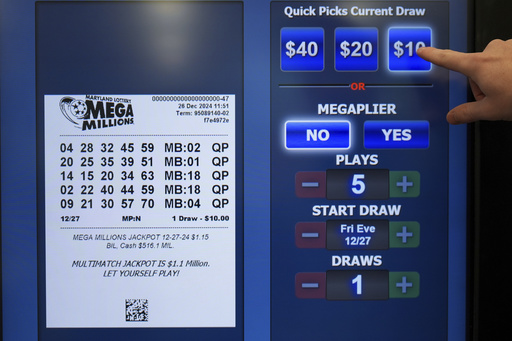Remember this moment, as it might not last long: a U.S. lottery jackpot has surged beyond $1 billion, and this is still significant news.
After a three-month stretch without a winner, a ticket worth approximately $1.22 billion was sold in California for the Friday night drawing. Such a remarkable figure has generated headlines and likely inspired many to visit convenience stores, dreaming of extravagant pursuits like personal space journeys.
Despite the fact that the top 10 jackpots in the country, excluding Friday’s draw, have already reached nine-digit amounts, the excitement seems to spark within people when the total surpasses $999,999,999.
“The lingering question is what happens when reaching $1 billion becomes commonplace, and people lose interest,” stated Jonathan D. Cohen, the author of “For a Dollar and a Dream: State Lotteries in Modern America.”
“After reaching a billion, there are no simple round figures left,” Cohen remarked. He further questioned, “How much wealth can a single person truly need?”
In April, the price of Mega Millions tickets is set to increase from $2 to $5. This adjustment is one among several changes that officials claim will enhance jackpot odds, offer more frequent large prizes, and lead to even greater payouts.
To understand the growth of lottery jackpots, it’s important to look back at their history:
Lotteries can be traced back to ancient Rome, Cohen explains in his book.
During Roman times, emperors and aristocrats would organize drawings at banquets, distributing prizes that could range from decorative pottery to enslaved individuals. By the 1400s, lotteries were a means of financing urban defenses and public works across Europe.
In the American colonies, lotteries were utilized to fund the fight against British rule. Notably, Thomas Jefferson endorsed lotteries, viewing them as a voluntary tax.
However, by the 1800s, lotteries declined in popularity in the U.S. due to concerns regarding fraud, mismanagement, and their negative effects on lower-income individuals. Beginning in the 1960s, however, various states began to legalize lotteries as a method to address budget shortfalls without resorting to tax hikes.
“Lotteries were perceived as miraculous budget solutions, presenting states with a way to generate revenue seemingly from nowhere,” Cohen noted.
The inaugural Mega Millions jackpot began at $5 million when the lottery was launched in 1996, known then as “The Big Game” and featuring just six states. This was an attempt to compete with Powerball, which had already expanded to include 20 states plus the District of Columbia.
In terms of inflation, that $5 million would now amount to nearly twice that sum. In today’s dollars, this pre-tax prize could cover a rare U.S. Constitution copy or support Michael Soroka’s estimated $9 million contract with the Washington Nationals.
In contrast, the jackpots from recent Mega Millions drawings could potentially purchase an entire Major League Baseball franchise, although the Nationals may be too pricey. Forbes recently valued the Miami Marlins at $1 billion, providing a rough comparison.
A more fitting comparison could be drawn with Taylor Swift’s 2023 tour revenue; her Eras Tour has achieved over $1 billion in ticket sales after moving more than 4 million tickets.
Looking ahead, her entire tour revenue is projected to exceed $2 billion by the time it concludes on December 8, according to concert industry analysts.
Explaining the reasons behind the rising jackpots, Mega Millions and its counterpart Powerball are now sold in 45 states, alongside Washington, D.C., and the U.S. Virgin Islands, with Powerball also available in Puerto Rico.
In October, Mega Millions officials expressed their intention to increase ticket revenue while improving odds, which they hope will encourage more winners, even as prizes skyrocket.
Popular games with substantial payouts tend to draw more participants, despite lower odds of winning. Larger jackpots generate heightened media interest, boost ticket sales, and attract new players, Cohen noted.
Lottery officials have opted to lower odds by expanding the number pool from which players can select, which has inadvertently made winnings tougher to secure, resulting in larger rollover prizes.
The first lottery to reach the $1 billion mark occurred in 2016, and Cohen is confident that this upward trend will persist.
Nevertheless, he cautions against the stereotypes surrounding lottery winners that often end in misfortune.
A notable case is Andrew “Jack” Whittaker Jr., who won a record Powerball prize in 2002 but faced scandals, lawsuits, and other personal challenges that left him grappling with trust issues due to persistent monetary requests from others.
However, Cohen stresses that not all winners face similar fates.
“Even if we deny it, there’s a widespread belief in meritocracy, implying that if you came into wealth by chance, you perhaps didn’t really earn it,” said Cohen. Yet studies reveal that “lottery winners generally report higher levels of happiness, health, and financial well-being compared to the average person.”
This website uses cookies so that we can provide you with the best user experience possible. Cookie information is stored in your browser and performs functions such as recognising you when you return to our website and helping our team to understand which sections of the website you find most interesting and useful.
